Caution: This post contains, like, personal feelings and stuff. Also minor character relationship spoilers for My Love Story (Ore Monogatari). You have been warned.
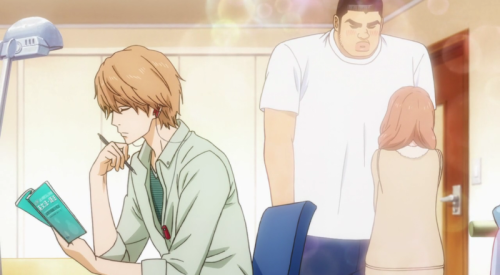
As a Millennial growing up in Midwest America, I was fortunate to live in a community and among friends who were relatively sex-positive and accepting of different lifestyle choices, even at school. While our health teachers still pushed abstinence as the best form of birth control, they also covered the other “safe sex” options and made it clear that it was “perfectly normal” to have “those urges.” Which is great, and a damn sight better than shaming or ignoring adolescent sexuality entirely.
Looking back, though, I sorta wish they’d also mentioned that it was perfectly normal to not have those feelings, too.
As a teenager, I didn’t know what “asexual” meant (and if you don’t either, you should probably check out this super-accessible webcomic before reading any further). I didn’t learn the word till my sophomore year of college, and I didn’t start using it to describe myself until about a year ago. Even now it feels strange (especially since I’ve only ever dated men and can generally “pass” as heterosexual), and I’m still getting used to being open about it. The Internet has been a big help. So has having a cool shorthand, since “ace” makes me feel like the best player on an anime sports team.
I don’t talk about it much because I’d rather people know me for my love of KU basketball or Tamora Pierce novels than my sexual preferences, but there’s no doubt it’s had an impact on my interests and interactions. The more comfortable I get with my identity, the more I realize how often Li’l Me was unconsciously seeking confirmation that there were other people and stories like her own.
And, often, I found that representation not in western television, film, or novels, but in anime and manga.
While there are exceptions, a lot of western media tends to be almost aggressively sexual, and just about every young adult TV series or film places major focus on it. A part of me is glad for that—we should live in a world where teens don’t feel ashamed for having sex drives and we encourage healthy or responsible behavior rather than repression—but it does sometimes make those of us who don’t feel that way wonder if there’s something wrong with us.
So maybe it’s no surprise that I scaled back on American shows in favor of anime and manga during my teen years. Their YA stories so often focused on close friendships, with protagonists who valued their families and friends as much as or more than romantic interests. And even when there was a romance (as there often was), it was frequently more emotional than physical, with the couple never going further than holding hands or sharing a kiss.
While the medium takes some (understandable) flack for all these chaste, glacially paced relationships, as a kid I loved those stories because they were pretty much my ideal romance. Shared feelings and close snuggles? Yes, please! Of course I knew there was an unwritten epilogue that was somewhat less G-rated, but I could still pretend that was the end of it, and float away on a fluffy cloud of romanticism. And that was good enough for a while. But, you know, it sort of isn’t anymore.
The issue here is that the vast majority of these narratives aren’t actual asexual representation any more than homoerotic bromances or “Class S” girl crushes are actual LGB representation. In fact, it’s sort of the opposite, because these shows act as if sexuality doesn’t exist at all, which can lead to infantilized characters, the idealization of virginity, and/or the implicit condemnation of physical desire as something dirty or shameful (this is especially true of “cute girl” shows targeted at older male audiences, but also of teen boys depicted as “perverts” simply for having sex drives).
In a way, the anime/manga trend of unsexing its characters is as disingenuous as the trend of oversexing characters in western media, and both often lead to asexual erasure. For a story to accurately depict an ace character (at least at this point in the uphill climb toward representation), it would almost have to take place in a world or community where sex was directly addressed, otherwise you’d have no real way to depict a character’s lack of interest to the audience.
Recently I’ve found myself looking for an explicitly ace character in my media—not “cold” or “traumatized” or “too busy,” but just plain ol’ uninterested—and I’m starting to think I’d have an easier time with that needle they buried in the local haystack (hey, I did tell you I live in the Midwest). There have been a few contenders—30 Rock’s Liz Lemon, Big Bang Theory’s Sheldon Cooper, Nozaki-kun’s titular character—but there’s always some element of the story that serves to minimize that sense of representation, that feeling that this is the character I can point to to help explain how asexuality works for me (although obviously I can only speak for myself; others might feel differently).
And then, this anime season, I found my love story. Or, to use the proper punctuation: MY love STORY!!
For those who don’t know, My Love Story (henceforth shortened to “OreMono”) is one of the cutest, funniest little rom-coms I’ve had the pleasure of watching. The series centers on an adorable and sweet (although certainly not perfect) relationship between Takeo and Yamato, two flawed but genuinely nice kids.
Despite some missteps, OreMono does overall clever work flipping gender and genre tropes, and is refreshingly direct in its approach to physical attraction as well as cultural expectations (for example, Yamato is constantly turned on by her boyfriend’s hawt bod, but often afraid to express that desire for fear she’ll be seen as “impure” because of it).
All of which is great for its own reasons (and I’ve discussed it at length in my episode posts, nudge nudge) but I’m using it here as background information so you’ll understand we’re dealing with a story that’s actually interested in sex and sexuality, which is what makes one of its characters stand out all the more.
Sunakawa “Beautiful Suna-min Roll” Makoto (or, you know, Suna for short) is Takeo’s best friend. He’s quiet and introverted, preferring to spend the day reading in his room than out with a large group of people, and rarely emotes in front of others. Even so, he cares deeply for Takeo (and Yamato) and genuinely enjoys spending time with them, even third-wheeling a few dates to help them get comfortable around each other.
He’s also turned down every girl who’s ever asked him out. When Takeo gives him flack for it (I like Takeo a lot, but he has some pretty serious internalized prejudices), Suna claims to be as interested in girls “as the next guy” but just thinks a relationship sounds “tiring.” Now, a lot of girls do find him attractive to the point of objectifying him, but it’s never depicted as a “trauma” so much as just something annoying he has to deal with, so I’d consider it an aspect of his life but not the cause of his disinterest.
However, unlike a lot of young, single characters in anime/manga who are depicted as oblivious or immature (i.e., it’s implied they’ll eventually become interested in sex), Suna is by far the most observant member of the cast. He’s empathetic, understanding, and able to spot a twitterpated teen from a mile away. Both Takeo and Yamato frequently come to him for a listening ear or relationship advice, and he’s quick to calm them down or point out any gaps in their flustered logic.
It’s not that he doesn’t “get” relationships. He does. And it’s not that he’s bitter or cynical about romance, either. He ‘ships Takeo/Yamato harder than any of us at home. There’s this great scene in a later episode where Yamato and Takeo are having a cute moment and Suna, smiling from the sidelines, remarks aloud: “This is nice.” He realizes what he’s said and quickly tries to explain himself, but the lovestruck pair assumes he’s wishing for a romance of his own and start brainstorming his “perfect girl.” All he can do is facepalm and beg them to stop.
Suna isn’t unfeeling, oblivious, immature, bitter, smug, or (near as we can tell) traumatized by something from his past. OreMono never tries to make the case that there’s something “wrong” with him. He’s just a nice, quiet kid who happens to be uninterested in pursuing a relationship of his own.
And, once I realized that, for the first time in maybe ever, I thought: This is me.
Sunakawa Makoto is me.
Now, I am mighty jaded at this point, so I have a feeling it won’t last—that the series will eventually succumb to heteronormativity and give Suna a (non-asexual) romance of his own. But even so, I’m grateful for that moment: the surprisingly powerful and real sense of understanding and belonging, like being certain no one’s gonna pick you to be on a dodgeball team and then hearing your name called at last.
It gets repeated so often it’s practically a mantra at this point, but representation in media is really freaking important, you guys. No matter your gender, race, sexuality, romantic interests, religion, culture, or even hobbies. No matter how old you are or how accepting your friends or family are or how comfortable you think you (finally) are in your own skin. Seeing someone who looks or acts or thinks like you, portrayed in a positive manner in a story you care about, can make you feel a little less odd, a little less alone—and like maybe other people can understand you a little bit better, too.
Fiction needs its Sunakawa Makotos as much as it needs its Gouda Takeos and Yamato Rinkos. And, for the time being, I’m very glad we have him.

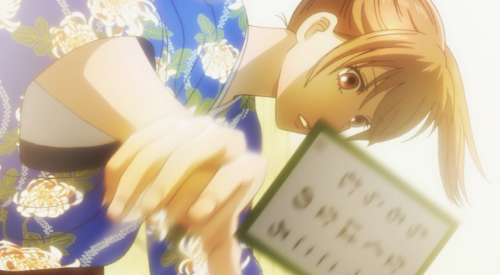
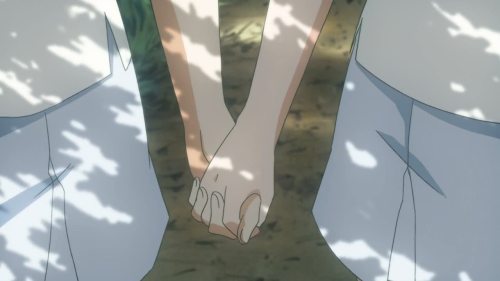
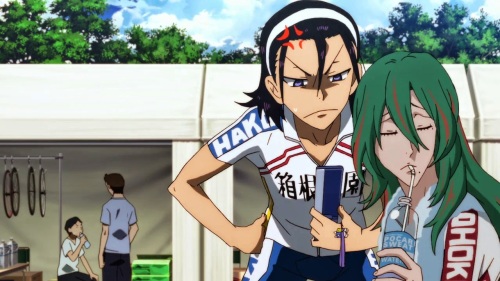
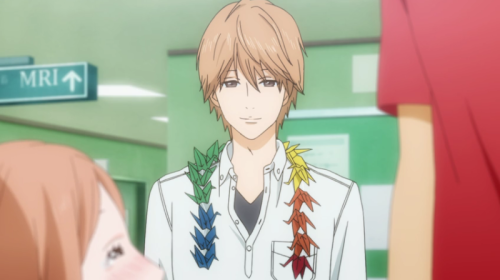
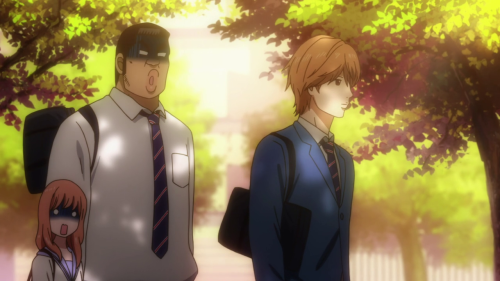
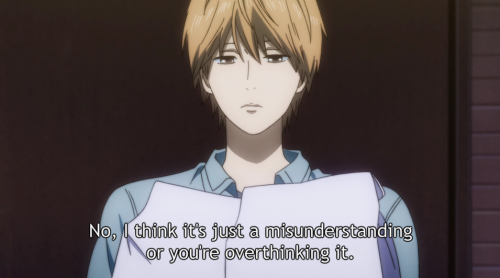
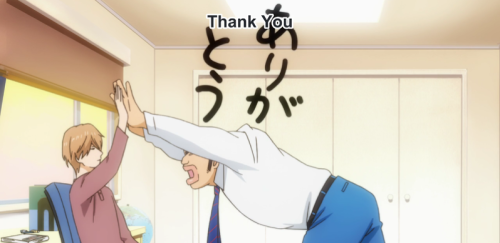
I absolutely loved this. This matters, so much.
Btw, I got to know your recaps via TMS, and when I got here, lo and behold, OreMono recaps, to my utter delight! And now this brilliant text about Suna and representation. This is just too great.
LikeLike
Thanks! This was probably the toughest thing I’ve written thus far and I was nervous as heck about posting it, so I’m really glad you liked it. I also saw that you dropped a comment on the most recent OreMono episode post over at Anime Evo, so yay for that, too! Hope to keep seeing you in the comment section, geeking out with the rest of us in the coming weeks. ^_^
LikeLike
Welp, you’ve officially sold me on watching OreMono. I’ve been reading all your recaps, and it seemed pretty promising as it is, but as a fellow ace girl this definitely moves it to the top of my watch list. I’ll be keeping my fingers crossed Suna stays readable as an ace, relationship or no.
LikeLike
Glad I could convince someone else to watch this adorable show! Hope you like it, and I’m definitely joining you with the crossed fingers.
Also, sorry it took so long for this to appear in the comments. WordPress shuffled it into my spam folder without telling me and I only just noticed it today. Silly WP. Your user name is approved for comments now, though, so we shouldn’t have any issues in the future.
LikeLike
I have to say, I really appreciate this post. It definitely reads as extremely genuine and I really applaud you for putting your personal life out there and using it to relate to and illustrate a point.
I’m ashamed that I don’t even think about anime in the same way you do. I guess for me, my relatability with anime and its characters has always been on an emotional level, but that’s only because below the surface I shared so much with these characters that I usually take for granted.
I think its interesting that Anime has this weird divide. The romantic stories, the one with emotion and exploration of relationships, kind of avoids the whole sex topic altogether, or briefly brushes up against it at most. Then, on the other side there’s ecchi shows that do quite the opposite, promoting sex at the cost of emotional development, plot or any kind of heart to the story.
I think at the end of the day its a numbers game. There are certain things that audiences take to, especially in Japan, that just work, and that’s why we get so much of them.
What would be truly awesome, taking your wants a step further, is a story that rightly does both elements justice, and explores ideas like asexuality within those confines.
Will it happen some day? I’m not sure. It’ll depend on how Japan itself continues to evolve as a society and what kind of impact that has.
But, whether it does or not, I think you ask some pretty important questions and definitely give us anime fans something to mull over and really ponder.
LikeLike
Thanks a ton, glad this you thought it was a good read! And y’know, everyone relates to fiction in a different way, and to different stories in different ways, and that’s what makes it such a fun experience and why chatting about it (either IRL or online) is such a great way to see how other people think and see the world. So definitely no need to feel ashamed about that. It’s what makes life interesting, imo.
Every once in a while I run into an anime or manga that does a really good job of balancing emotional love/like with physical lust, and I’m always so very grateful for them. But you’re right, they’re really few and far between, and I think it does have a lot to do with demographics and what you can/can’t do within certain genres. All the more reason why I’m grateful a show like OreMono exists.
LikeLike
Great stuff! Getting to read people’s stories like this is always such a cool thing—and I definitely feel privileged to have had a chance to read some of yours.
Also, you live in the Midwest!?!? OMG I’M NOT THE ONLY ONE
LikeLike
Thanks! Writing this was like pulling teeth (soooo many false starts and deleted paragraphs), so I’m both happy and super relieved to hear that it was a worthwhile read for you and others. Although I probably only have the courage to write seriously about myself like once a year, tops, so it’ll be all semi-detached analyses and silly recaps for the next 12 months or so. ^^;
H’oh yeah, that’s right, I remember a while back you said you went to a Con in St. Louis ’cause it was close to where you lived! Midwestern Fist Bump of Solidarity!
LikeLike
Very in-depth and insightful post! You’re a good writer and I’ve been watching Ore Monogatari myself and I feel it has a lot of heartfelt charm to it!
LikeLike
Thanks, and glad to hear you’re enjoying the series, too! It’s one of my favorites of the season and I’ve been having a blast writing about it.
LikeLiked by 1 person
Brilliant, insightful and touching post! I started following your blog because of Yona of the Dawn (still heartbroken it’s over), and just started watching My Love Story!! thanks to your recommendation… came back to read your re-caps in tandem with my watching and was surprised but happy and impressed to have found this post :-)
LikeLiked by 1 person
I know I’m late to the party on this article, but I just want to say as someone who’s been a fan of yours for a couple of years, it makes me so happy to not just find another ace but to also read something that I relate to so strongly. I’ve also had a hard time finding representation, and while some western properties like Jughead have given it to me, the only character that I’ve been able to read as Ace in anime and manga has been Monkey D. Luffy and, like what you described with Suna, the cynic in me is waiting for when he gets married and has a kid. On a happier note, my heart soared when I read this and saw that someone else had the same frustrations and feelings I’ve had and I want to thank you for sharing this.
LikeLiked by 1 person
Thanks, Aidan! This was a tough piece for me to write (I don’t like getting too personal in my public writing), so I really appreciate hearing that it resonated with you. (I’m also pleased to announce that Suna stayed single for the entire manga series, so my headcanon lives on!)
LikeLike
Yagate Kimi ni Naru (Bloom into You) is a sweet lesbian love story with a side character that explicitly states, that he is ACE/ARO and acts accordingly. Just in case you had missed that show I think you may well enjoy it.
LikeLike
I’ve watched it and enjoyed. Ace rep in manga has come a fair ways since I wrote this article, which has been really heartening to see! Hopefully that continues in the coming years as well.
LikeLike